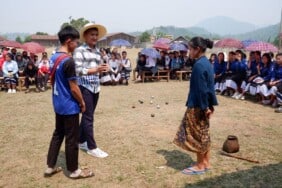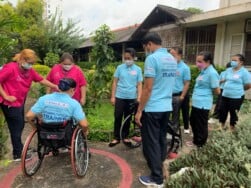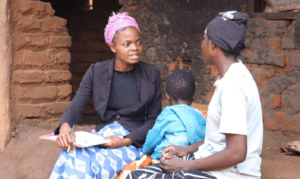The Role of Education in Ensuring Health for All
April 6th, 2023 | Blogs
Healthcare is a human right. Everyone deserves to live a healthy, fulfilled life free from the restrictions of untreated needs and the burden of high healthcare costs. For the last 75 years, the world has celebrated World Health Day, reflecting on what we’ve achieved in public health and what we have still to do to ensure health for all.
With 30% of the world’s population unable to access health services, we must strengthen health systems and skill healthcare workers to fight public health crises and reach people everywhere with affordable and inclusive care.
In these efforts to achieve health for all, education plays a key role.
Education creates knowledge and then awareness. Some people have never received EORE messages, while other people have received training and at least they know where there is risk. They might change their behavior to be safer. People who have more knowledge will have less risk than others.” -Souvankham Phaxaysombath, MEL Officer
In rural areas of Laos and Myanmar, unexploded ordnance (UXO) left behind from the Indochina War and internal conflict is often found by a farmer or a child at play. Explosive ordnance risk education (EORE) raises awareness of the dangers of UXO and promotes safe behaviors to avoid life-altering injuries. Throughout our years of experience delivering EORE in these countries, we’ve developed curriculum, trained teachers in curriculum instruction, and partnered with village education development committees to reach workers and out-of-school individuals.
Those who are injured by UXO receive support to access medical care through the War Victims Medical Fund, which covers healthcare costs and associated expenses, like transportation and lodging.

Unless you have family or friends who experience disabilities, you don’t understand the huge importance of disability inclusion. This is why education plays an essential part, because once people understand how life is for those living with disabilities, they are motivated to make everything in life accessible to all.” -Rebecca Derry, Laos Country Director
For those with chronic conditions, injuries, and illnesses that lead to experiencing a disability, we’re working to promote inclusion and increase access to services. In Laos, there is a shortage of rehabilitation and mental health professionals, limited services and treatments, and many barriers to accessing services (cost, transportation, awareness).
By skilling rehabilitation workers, connecting people with disabilities to those who provide assistive products and home modifications, and changing public perception around disabilities, healthcare is becoming more accessible and sustainable for people in hard-to-reach places.

Education is the backbone for building a stronger and more effective public health system. Bantwana provides health education talks and other health promotion interventions using family and community-centered approaches to strengthen health systems.” -Deliwe Msiska, Technical Lead
Building up health systems to identify needs and deliver services is also crucial for tackling public health crises like HIV and gender-based violence (GBV). Many of the risks of HIV infection, GBV, and poor sexual and reproductive health intersect, so improving access to services and treatments requires an integrated and coordinated response.
We’re supporting systems in Malawi to create an integrated service referral network, use HIV-sensitive case management, and improve coordination between health facilities, clinical service providers, and social welfare workers.

By increasing access to knowledge, promoting healthy behaviors and challenging harmful cultural and social norms and stereotypes, education can be a powerful tool for positive change in addressing HIV and GBV.” -Ntando Ntaka, Safe Schools Officer
Along with HIV and GBV treatment and care, increasing health knowledge – like the importance of condom use – and changing harmful social norms can prevent new infections and reduce GBV occurrences. In Zimbabwe, the Health4Life social asset building package includes these education and behavior change efforts, as well as economic strengthening and positive parenting interventions.
In Uganda, we’re using education to address the norms that lead to violence against children at schools and homes. Sexual abuse prevention curriculum is working to stop abuse from happening, and trained teachers and child protection workers are increasing identification and response. We’re strengthening response pathways and child protection systems to ensure survivors of abuse receive critical post-violence services (health, legal, counseling, etc.).
Education is a worthwhile investment… and the most effective way to spread essential messages to people at all levels, being able to pass imperishable information from generation to generation.” -Mack Phoutthaxay, Training & Curriculum Development Coordinator
World Education strives to build lasting relationships with partners across diverse geographic regions and technical sectors to produce better education outcomes for all.